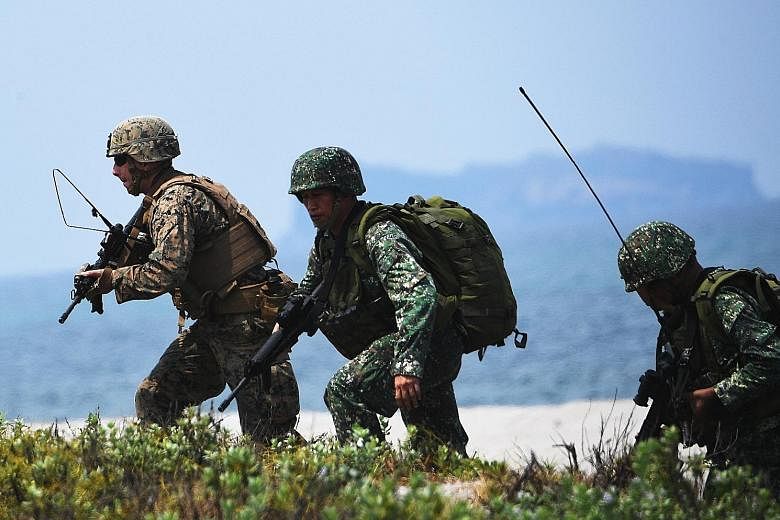The United States warned yesterday that any attack on Philippine security forces in the South China Sea would trigger a 67-year-old treaty requiring American troops to intervene.
"Any armed attack on Philippine forces, aircraft or public vessels in the South China Sea would trigger mutual defence obligations under Article 4 of our Mutual Defence Treaty," US Secretary of State Mike Pompeo said at a news briefing.
Mr Pompeo arrived in Manila on Thursday, after taking part in a summit in Hanoi between US President Donald Trump and North Korean leader Kim Jong Un.
Mr Pompeo said the Philippines, as an island nation, "depends on free and unobstructed access to the seas". "China's island-building and military activities in the South China Sea threaten your sovereignty, security and therefore economic livelihood, as well as that of the US."
Mr Pompeo's remarks, Washington's starkest warning yet, mark the first time that any US official has publicly stated Washington's intent to defend its ally in the South China Sea.
Speaking in Beijing at a regular briefing, Chinese Foreign Ministry spokesman Lu Kang said China and the countries around the South China Sea were working hard to protect peace and stability.
"So if countries outside the region, like the United States, really want to consider the peace, tranquillity and well-being of people in the region, then they shouldn't make trouble out of nothing and incite trouble," Mr Lu said.
China claims nearly all of the South China Sea, a strategic route through which about US$3 trillion (S$4 trillion) worth of sea-borne goods passes every year.
To assert its claims, it has transformed reefs into islands in the Spratly archipelago, in the southern half of the South China Sea. Satellite and aerial surveillance has found emplacements for missiles, 3km-long runways, extensive storage facilities and a range of installations that can track satellites as well as foreign military activity and communications on these islands.
US Navy ships have sailed close to these Chinese-occupied islands to assert freedom of navigation in the South China Sea.
Critics have said President Rodrigo Duterte's foreign policy is eroding the Philippines' claims with a tepid response to China's massive expansion and militarisation of its outposts in the Spratlys.
Mr Duterte has said he has refused to confront China head-on as he cannot count on the US for help.
Mr Pompeo said: "Our commitments under the treaty are clear. Our obligations are real."
He added that the US "remains committed to supporting not only the Philippines… but all the countries in the region, so that these incredibly vital economic sea lanes are open, and China does not pose a threat to closing them down".
Besides China and the Philippines, Vietnam, Malaysia, Taiwan and Brunei have also laid claim to all or part of the South China Sea.
The US and the Philippines are long-time allies bound by the 1951 Mutual Defence Treaty. Under the treaty, regular war games are held, bringing thousands of US troops and state-of-the-art American military hardware to the Philippines.
Manila and Washington are also bound to aiding each other in the event of an attack. But the treaty's role in the Philippines' sea dispute with China has remained unclear.
Defence Secretary Delfin Lorenzana earlier said the government wants to review the treaty to get the US to commit to coming to the Philippines' aid in case of Chinese aggression in the South China Sea.
But Foreign Secretary Teodoro Locsin yesterday said a review of the defence treaty requires further thought. He said: "I believe in the old theory of deterrence. In vagueness lies the best deterrence. Specificity invites evasion and actions outside the Mutual Defence Treaty framework. I don't believe that going down into the details is the way the sincerity of the American commitment will be shown."
He added that the Philippines was "very assured, very confident… in the words of Secretary Pompeo and the words of President Trump… that, 'We have your back'."

